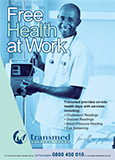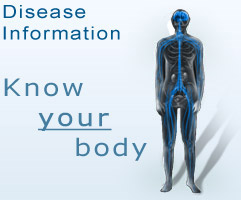Depression
What is depression?
Depression is a condition associated with low mood, feelings of unhappiness, despair and hopelessness, in such a way that it affects your daily functioning and interaction with others.
Types of depression
There are different types of depression:
1. Major depression
Major depression causes five or more of the symptoms mentioned below every day for at least two consecutive weeks.
2. Dysthymia
This is a less severe type of depression that involves long-term, chronic symptoms that last for years and do not disable the patient, but prevents him or her from fully functioning or feeling good. Sometimes patients with dysthymia also experience major depressive episodes.
3. Bipolar disorder
This was previously known as ‘manic-depressive illness'. This condition involves cycles of depression and elation or mania. Mania often affects judgment, thinking and social behaviour in ways that cause serious problems and embarrassment.
4. Other forms of depression include:
Postpartum depression - new moms may experience the ‘baby blues' after childbirth, which commonly include mood swings and crying spells that fade quickly, lasting generally a week or two after the birth of the baby. Postpartum depression may appear to be the baby blues at first, but the signs and symptoms are more intense and longer-lasting, eventually interfering with her ability to care for her baby and handle other daily tasks.
Premenstrual syndrome - symptoms of depression that occur about a week before your menstrual cycle and disappear after you
menstruate.
Symptoms of depression
- Persistent sad, anxious or ‘empty' mood
- Feelings of hopelessness and pessimism
- Feelings of guilt, worthlessness, helplessness and self-reproach
- Loss of interest in hobbies or activities that were once enjoyed, including sex
- Insomnia, early-morning waking or oversleeping
- Weight loss/gain or overeating/loss of appetite
- Decreased energy, fatigue, and feeling 'slowed down'
- Increased use of alcohol or drugs or self-medicating
- Thoughts of death or suicide, or suicide attempts
- Restlessness, irritability and hostility
- Difficulty concentrating, remembering and making decisions
- Persistent physical symptoms, such as headaches, digestive disorders and chronic pain, which do not respond to treatment
- Deterioration of social relationships
Causes of depression
For each person, there is a complex, individual pattern of factors that work together to either allow or prevent depression at any given time. Sometimes it is possible to point to a specific event that seems to have triggered depression. However, at other times depression may come about for no apparent reason.
Some possible reasons include:
- stressful life events, such as loneliness, relationship difficulties, financial worries, legal problems, retirement, empty nest syndrome or other stressors;
- genetics, i.e. researchers now realise that genetic factors are significant; having close relatives who have had depression means that you are more likely to become depressed should the circumstances dictate;
- physiological or ‘biochemical' factors, i.e. depression can be caused by an imbalance of brain chemicals called neurotransmitters, e.g. the levels of serotonin, which helps regulate sleep and appetite, mediate moods and inhibit pain, could be too low;
- physical illness; and
- a physical condition, such as a stroke or a thyroid problem.
Treatment of depression
Antidepressants
Antidepressants need to reach a certain blood level before they become effective. This can take up to six weeks, but for most people a response can be expected within two to three weeks. Always take the medication as prescribed and do not adjust or stop your medication without first consulting your doctor.
Electro-convulsive therapy (ECT)
This treatment is very effective and involves electrical stimulation to the brain while a person is under anaesthetic. It is usually reserved for people who are severely depressed or who fail to respond to antidepressant medication or psychotherapy.
Psychotherapy
This involves the verbal interaction between a trained professional and a person with emotional or behavioural problems. The therapist applies techniques based on established psychological principles to help the person gain insight into his or her situation and equip them with positive coping skills to make the necessary changes.
Support groups
A support group is a very good way to get support and advice from people who know how you feel, as they have also felt the same way themselves. The support group may be run by patients for other patients, creating a safe place where you can discuss your experiences and obtain help.
What can I do to help myself?
Read literature on depression in order to remove the misconceptions, fear or guilt which you may be experiencing. You may consider one or more of the following practical means:
Relaxation
Exercise, listen to audio tapes, do yoga, meditate and use aromatherapy and massage therapy.
Change in lifestyle
Many people who suffer from depression tend to be perfectionists and drive themselves much too hard in the things they do. Our own impossible standards need to be lowered slightly and our ‘workload' reduced so that life can be lived at a slower pace.
Diet
It is very important to have a well-balanced diet, which will prevent you from feeling tired and run down. Regular meals are vital to maintain blood sugar levels, as a low blood sugar level affects mood and energy.
Avoid ‘props'
These include vices such as smoking, drugs and alcohol, which can be very damaging. Alcohol in particular is a depressant and despite providing a temporary lift it can definitely worsen depression.
Keep occupied
You may read a book, watch a film or pursue a hobby. This will assist with relaxation and act as a diversion. It is important to schedule time in your day for rest and recreation.
Holidays or short breaks
If this is possible, a short break usually brings some relief by interrupting the daily routine.
References
http://www.uptodate.com/home/index.html
http://www.nlm.nih.gov/medlineplus/index.htm. The South African Depression and Anxiety Group - Postpartum Depression. The American College of Obstetricians and Gynecologists, August 2012
 TransmedBanner4.jpg)

